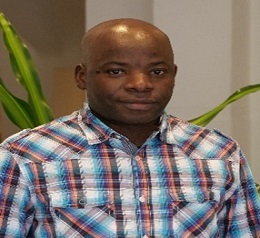4th Global
Women’s Empowerment & Leadership Summit
THEME: "Break Barriers, Build Futures"
 27-28 Oct 2025
27-28 Oct 2025  Bali, Indonesia
Bali, Indonesia THEME: "Break Barriers, Build Futures"
 27-28 Oct 2025
27-28 Oct 2025  Bali, Indonesia
Bali, Indonesia 
ISS of Erusmus University Rotterdam, Democratic Republic Of The Congo
Title: Sexual exploitation and abuse: implication of UN peacekeeper and humanitarian workers in the Democratic Republic of the Congo
Delu Lusambya is a PhD researcher at the International Institute of Social Studies of the Erasmus University Rotterdam, Delu is writing his PhD on humanitarian governance in the Democratic Republic of the Congo (DRC), focused on community-driven accountability and advocacy in humanitarian actions. He holds a master’s in international Organizations and the Protection of Human Rights from the Human Rights Institute of Lyon at the Catholic University of Lyon in France. With 15 years of experience in local and international humanitarian and development organisations, Delu has significant experience in project management, peacebuilding and youth programming in DRC, Kenya, Central Africa Republic, Rwanda and Burundi. He speaks French, English and Swahili
Since the beginning of humanitarian crises and the deployment of UN peacekeepers in the Democratic Republic of the Congo (DRC), sexual exploitation and abuse (SEA) have become a significant issue in the humanitarian sector. Despite several codes of conduct and guidelines established by the United Nations, SEA remains a persistent and acute problem in the DRC. Drawing on empirical data from the perceptions of aid workers and victims of SEA, this paper critically examines the circumstances surrounding SEA within the humanitarian sector and peacebuilding operations in the DRC. Specifically, it explores the experiences of low-level staff of humanitarian NGOs, UN agencies, and crisis-affected communities around peacekeeping camps.
The testimonies of SEA survivors reveal multiple patterns of SEA with overlapping elements, including SEA for jobs, SEA for funding, SEA for job security and promotion, SEA for humanitarian assistance, and abuse of domestic staff, workers in expatriate offices and/or guesthouses. While several reporting and accountability mechanisms are available to report their cases, they have several drawbacks due to the lack of effective communication of their existence to victims, coupled with a lack of trust in the confidentiality and effectiveness of the mechanisms. As long as accountability mechanisms remain unknown and untrusted, survivors will not use them, and these phenomena will remain a problem.